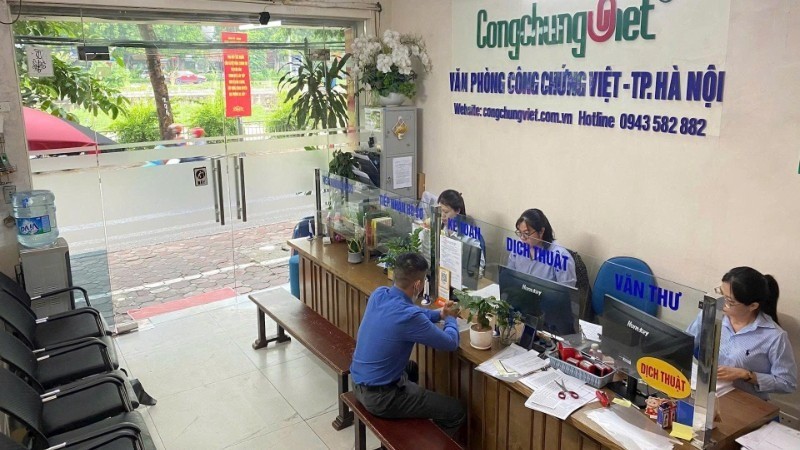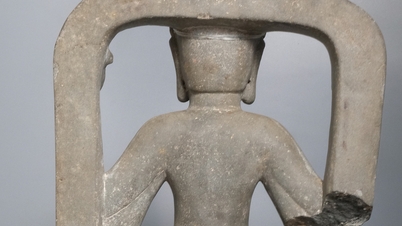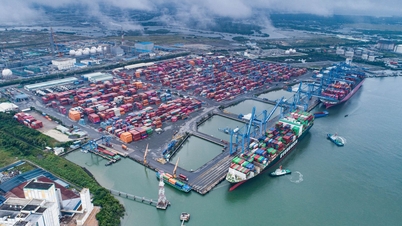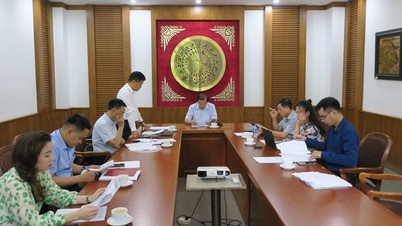
Not yet synchronized about database
From July 1, 2025, the Notarization Law 2024 (amended) and Decree 104/2025/ND-CP detailing a number of articles and measures to implement the Notarization Law officially take effect, allowing direct and online electronic notarization. Accordingly, notarization is performed entirely in an electronic environment, without using documents and producing notarized documents in electronic form.
Nearly 2 months later, at the Viet Notary Office (219 Nguyen Ngoc Vu, Hanoi ), among the many people who came to do the procedures, no one chose the electronic notarization method. Ms. Le Thu Ha, Dai Mo Ward, Hanoi said: “Today I came here to notarize a house sale transaction. Actually, I haven’t heard much about electronic notarization, so I chose to do traditional notarization. Holding and managing it myself is less worrying.”
Mr. Tran Van Chinh, a Notary of the office, said that not only people do not understand, but even the Notaries do not know how to do it, while the office's infrastructure and machinery do not meet the requirements.
“We all understand that it is done online. However, according to the new regulations, even though notarization is done electronically, the signing of documents in the presence of a notary must be photographed and stored in the notarization file. We are still waiting for specific instructions on the process as well as being provided with a new terminal device to be able to do it,” Mr. Chinh added.
Not only at Notary Offices but also at Notary Offices, this situation is no different. According to Mr. Tran Thai Binh , Head of Notary Office No. 3 in Hanoi, many people still do not understand and are not ready for the form of electronic notarization, especially notarization of real estate transactions.
Meanwhile, up to now, there has been no connection for electronic notarization records to the National Public Service Portal, electronic notarization documents still "remain" at the Notary Office or Notary Office and in the hands of the people. Therefore, it is necessary to carefully study so that people can enjoy a smooth, interconnected electronic process, a synchronous system and legal safety.
According to Associate Professor, Dr. Doan Hong Nhung, Deputy Head of the Legal Department of the Vietnam Real Estate Association (VNREA), the legal framework for electronic notarization in Vietnam is not really complete and consistent, leading to many difficulties in practical application. Regulations related to electronic notarization, storage and use of digital documents are not consistent, causing difficulties in recognizing the legal value of electronic records.
Meanwhile, the connection of notary databases has only been implemented locally and has not yet reached the national scale. If the data storage system is not standardized or technical problems occur, the possibility of disputes arising is very high.
Recently, the Vietnam Notary Association has proposed to the Prime Minister to urge the implementation of rapid connection of notary databases with existing databases on land, civil status, etc. When the databases are connected and interconnected, electronic notarized documents can be used effectively and conveniently for other procedures related to registration of transaction changes, taxes, etc.
Information security is required.
The issue remains a major challenge for electronic notarization, especially the notarization of real estate transactions, which are easily targeted by cybercriminals, raising concerns about data disclosure or falsification.
The information technology infrastructure of many Notary Offices is still limited, not meeting the requirements of speed, security and long-term storage capacity, investment costs are still a burden for many offices; at the same time, the risk of information leakage is not small. The connection and sharing of data between the notary system and the national database on population, land and enterprises is still not synchronized, causing difficulties in verifying and comparing information. Meanwhile, the human resources of notary organizations are still lacking and weak in technological skills to deal with the high risk of cybercrime.
According to Mr. Phan Duc Hieu, full-time member of the National Assembly's Economic and Financial Committee, data security and safety issues are not only legal regulations but also depend on technology, software and many other factors, of which the biggest challenge is technology.
Associate Professor, Dr. Doan Hong Nhung said that it is necessary to build a unified legal corridor between relevant laws, specify the legal value of contracts and digital signatures, and develop a national land database connected to the notary, banking and tax systems; the Notary Law needs to be amended to recognize electronic notarization, remote authentication associated with modern identity authentication solutions such as eKYC and biometrics; a strict personal data protection mechanism and strict sanctions against violations are needed so that the digitalization of notarization activities can operate effectively, safely and partially replace traditional notarization.
Source: https://baolaocai.vn/cong-chung-dien-tu-can-cu-huych-de-thuc-thi-hieu-qua-post881555.html





![[Photo] Politburo works with the Standing Committees of Dong Thap and Quang Tri Provincial Party Committees](https://vphoto.vietnam.vn/thumb/1200x675/vietnam/resource/IMAGE/2025/9/8/3e1c690a190746faa2d4651ac6ddd01a)
![[Photo] Politburo works with the Standing Committees of Vinh Long and Thai Nguyen Provincial Party Committees](https://vphoto.vietnam.vn/thumb/1200x675/vietnam/resource/IMAGE/2025/9/8/4f046c454726499e830b662497ea1893)
























![[Photo] Amazing total lunar eclipse in many places around the world](https://vphoto.vietnam.vn/thumb/1200x675/vietnam/resource/IMAGE/2025/9/8/7f695f794f1849639ff82b64909a6e3d)


































































Comment (0)